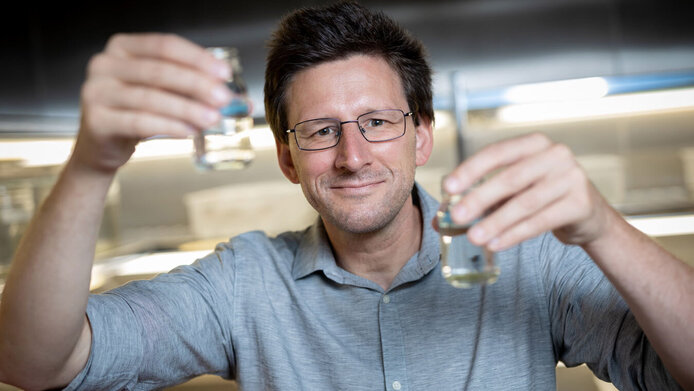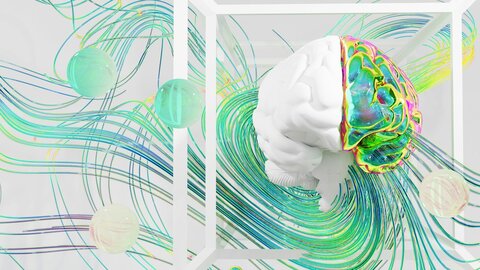Preparing freshwater lakes for global change

What brought you to research?
Markus Möst: My father taught biology at a secondary school. And I grew up in a small village in the eastern Tyrol region, surrounded by nature. Both these things contributed to my developing a keen interest in nature at an early age. I wanted to study biology as soon as I started going to school. My original plan was to work in applied science, but when working as a lab assistant in Uppsala, Sweden, I changed my mind and moved towards academic research. The START Award helps with getting more established as a scientist and supports me in pursuing my research interests.
Where will your path lead you?
Möst: As in my PhD studies, I work on water fleas and hybridisation – what happens if different species interbreed, giving rise to hybrid offspring. The START project will examine the interaction between this evolutionary change and ecological changes. Such eco-evolutionary dynamics help us understand and predict global change.
What are the additional factors in global change as compared to climate change?
Möst: There are many, including over-exploitation of resources such as fish populations, pollution and habitat destruction. I will focus on two stressors: first, eutrophication, especially in the mid-20th century when raw sewage and untreated wastewater were piped into water bodies. At the time, detergents still contained phosphates, which threw aquatic systems totally out of balance. My second focus is on the ever more massive heat waves and their impact on lakes. These two factors interact.
Personal details
Aquatic ecologist Markus Möst works at the Department of Ecology, University of Innsbruck. An expert in evolutionary ecology, he has researched evolutionary changes in populations of tropical Heliconius butterflies and water fleas. After completing his PhD studies at ETH Zurich, Department of Aquatic Ecology, Möst was awarded an Erwin Schrödinger Fellowship by the Austrian Science Fund FWF, enabling him to continue his research work as a member of the Butterfly Genetics Group at Cambridge before returning to Innsbruck, where he joined the Molecular Ecology Group.
Our project examines these interactions between evolutionary and ecological change. Eutrophication of lakes in the Prealps region, for example, has caused different water flea species to become invasive and interbreed with local populations. I look into how these mixed populations change the ecosystem, and how this in turn modifies the reaction to heat waves.
Why do you study water fleas?
Möst: The so-called Daphnia are key organisms. Their influence on ecosystems is particularly strong, and they are a crucial part of the food-chain in many lakes. Put simply, when they are gone, fish find nothing to eat, and algal growth is no longer checked. Another advantage for research is that you can keep them in clonal lines because Daphnia will produce identical clones under the right conditions. This enables us to study identical genotypes in different experiments with varying stressor conditions. Moreover, they lay “resting eggs” which sink to the bottom of the lake where they are covered by sediment. By sequencing eggs of different ages, we can reconstruct evolutionary changes, including hybridisation. We want to go back to the time before eutrophication occurred to see how the water fleas have changed since then.
Which lakes will you be working on?
Möst: Our project covers twelve lakes in the Prealps, including Mondsee, Lago di Garda and Lago Maggiore and Lake Constance. Research of these water flea species has traditionally focussed more on Germany and Switzerland. Now the eastern alpine region in Austria will be more closely examined as well, including a number of lakes in Carinthia. We plan to include four lakes each in Switzerland, Italy, Carinthia, the Salzkammergut region and Germany.
What is your personal goal in this project?
Möst: I want to help improve our ability to predict, and hence to control and mitigate, global change. We have already passed beyond the point where fully natural ecosystems still existed, at least in Europe. Every one of the Prealps lakes is affected by human settlements and pollution. We have already made a very strong impact on the whole planet. More and more ecosystems must be actively managed to maintain their essential functions, which are crucial to us humans, as they are for other species. To do that, we have to understand the systems and know how they react to stressors.
I hope that the insights from the START project will be helpful in practice. Ecosystems are changing ever more rapidly, and if we have to intervene, our approaches should be informed and well-considered.
Do you have a role model?
Evolutionary biologists tend to name Darwin as a role model, but like all of us, he had his darker side as well. I take my inspiration from different persons who are particularly good at certain things, and I try to learn from them.
About the project
Water fleas are a particularly apt subject for research into the interactions between evolutionary and ecological change. The aim of the project “Eco-evolutionary dynamics – gene flow and global change” is to understand the effects of global changes on aquatic ecosystems and thus to contribute to improvements in lake and ecosystem management. The research focuses on twelve lakes in Austria, Italy, Switzerland and Germany.
The START Prize
The START Programme of the Austrian Science Fund FWF is aimed at outstanding young researchers, giving them the opportunity to plan their research over an extended period and with a high degree of financial security. It is endowed with up to EUR 1.2 million and is one of Austria’s most prestigious and most highly endowed awards alongside the Wittgenstein Award.





